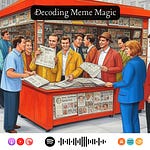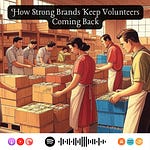The question of whether artificial intelligence (AI) can be truly creative is a hot topic. On this episode of Marketing Science Lab, we discuss a fascinating academic article that delves into the very essence of human creativity and its intersection with AI. This isn't just about robots painting pictures; it's a philosophical exploration of art, music, and the implications for humanity (Fernandes, 2024).
The article presents two contrasting viewpoints. One argues that true creativity is inherently human, something AI can mimic but never truly replicate. The opposing view suggests AI may already surpass human capabilities in ways we don't fully grasp. This challenges our traditional pedestal of creativity as a uniquely human trait and makes us question: what happens when machines create art that moves us or music that resonates deep within? Does it devalue human expression or redefine it?
The article introduces the concept of "anthropological loss"—the potential devaluation of human skills in a world where AI can create works comparable to our favorite authors or composers. Imagine anyone writing a novel as good as your favorite author, or a symphony as breathtaking as Beethoven's, simply by using AI. It forces us to confront the value of years of dedicated practice and honed craft.
This leads to a discussion about how we even measure intelligence and creativity, using tests like the Turing Test as a starting point. But can such tests, designed to assess intelligence, accurately evaluate something as subjective and nuanced as creativity? The article argues that while useful in some contexts, the Turing Test falls short when applied to art. Mimicking technical skills is one thing, but capturing the essence of human experience, the emotions, and the inspiration is quite another. Can you program a computer to feel the same way we feel when we create?
This is where the concept of the "Lovelace Effect" comes into play. We're more easily impressed by AI creativity because we don't expect machines to be creative. This element of surprise, the "wow" factor, is influenced by our inherent biases. But our gut reactions to AI art, especially negative ones, reveal much about our own biases. Imagine loving a piece of art only to discover it was created by AI. Does that change your perception? Would you feel cheated, almost repelled, knowing it wasn't created by a human with a soul and emotions?
This "aversion," this reaction, might actually be proof of how creative the AI truly is. Rejecting something simply because it was made by a machine could stem from a subconscious challenge to our beliefs about what it means to be human, especially a creative one. The question isn't whether AI art fits our definition of creativity, but whether we are even equipped to judge it. Are we letting our own limited ideas about creativity prevent us from experiencing something new, something potentially beyond what we thought possible?
The article then poses a radical question: what if a machine creates art solely for other machines, entirely separate from human perception? Is that still art? If there's no human to experience or understand it, does it hold any meaning? This makes us rethink why we create art in the first place. Is it about expressing ourselves, communicating our feelings, or can art exist on its own as a way for AI to explore, a byproduct of complex algorithms?
If AI can achieve pure creativity, what does that say about us? Are we ready to appreciate AI art for what it is, even if it means facing our discomfort and changing how we define art? This introduces the intriguing "Aesthetical Aversion Turing Test"—assessing not the AI's creativity, but our reaction to it. It sizes us up, revealing our biases through our gut response to art.
This raises exciting and concerning possibilities. Will AI replace human artists, musicians, and writers? Or will it become a tool, a partner, helping them reach new creative heights? The article reframes the narrative from "us versus them" to AI as a partner in creativity. Imagine architects using AI to design functional and beautiful buildings, filmmakers creating incredibly realistic special effects, or scientists analyzing massive datasets to accelerate discoveries in medicine and energy. AI could free us from the limits of our own minds, allowing us to achieve more than we ever could alone. This shifts the focus from anthropological loss to anthropological gain.
By taking on some creative work, AI might free us to focus on uniquely human qualities like empathy, compassion, critical thinking, and our capacity for love and connection. AI can handle the technical aspects, while we provide the meaning, the heart. AI might compose a melody, but it takes a human to turn it into a song that evokes emotion.
We shouldn't fear AI but be excited by its potential. Maybe it's not here to replace human creativity, but to redefine and expand it, pushing its boundaries and making us even more creative than we ever thought possible. Edilberto Fernandez's research on AI ethics and the future of art in a tech-driven world is mind-blowing and deserves a deeper look.
Interactive Study Guide: https://quizlet.com/study-guides/ai-and-the-future-of-creativity-in-art-and-music-b17b5f57-e6f6-4bf2-9b94-961ccc311e82?i=3i62em&x=13qt
Source:
Fernandes, A. (2024). The Replacement of What? Artificial Intelligence, Creativity and (More-than-) Humanness. Journal of Creative Communications, 0(0). https://doi.org/10.1177/09732586241275955
Related FAQs
Q: What is the main topic of the blog post?
A: The main topic of the blog post is whether AI can truly be creative and the potential implications of AI creativity for marketing and business.
Q: What are some of the challenges facing creative AI?
A: Some of the challenges facing creative AI include the difficulty of evaluating AI-generated content, the potential for AI to perpetuate biases, and the need for AI to be able to understand and respond to human emotions.
Q: What are some of the potential benefits of creative AI?
A: Some of the potential benefits of creative AI include the ability to generate new ideas and content, the ability to personalize marketing campaigns, and the ability to automate tasks.
Q: What are some of the ethical considerations surrounding creative AI?
A: Some of the ethical considerations surrounding creative AI include the potential for AI to be used to create harmful or misleading content, the potential for AI to displace human jobs, and the need to ensure that AI is used responsibly.
Q: What is the future of creative AI?
A: The future of creative AI is uncertain, but it is clear that AI has the potential to revolutionize the way we create and consume content.












